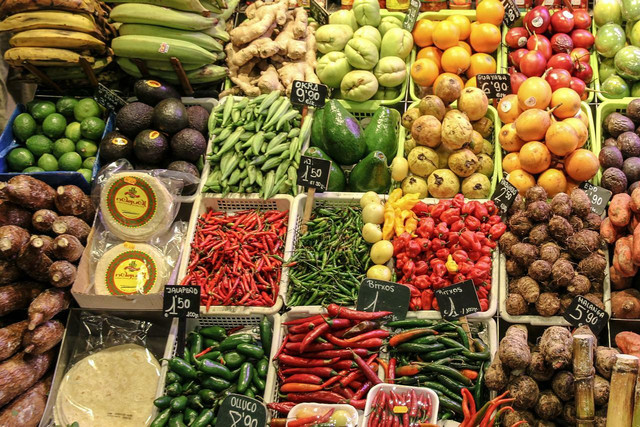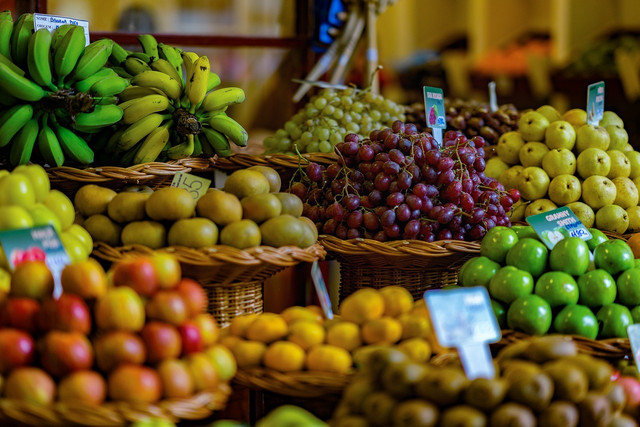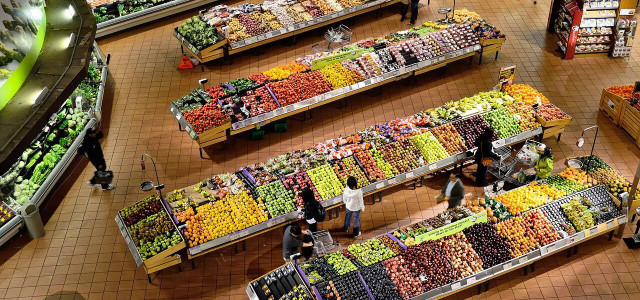The Dirty Dozen and Clean 15 may be a familiar concept to you already, but did you know the list gets updated every year? Read on to learn more about the list for 2022.
The “Dirty Dozen” and “Clean Fifteen” (commonly spelled “Clean 15” in writing) are lists from the Environmental Working Group’s (EWG) 2022 Shopper’s Guide to Pesticides in Produce™. The EWG compiles and updates these yearly lists of fruits and vegetables to help you understand which produce is okay to buy when not certified organic — the Clean 15, and others that are best to buy organic — the Dirty Dozen.
Though buying organic is important, it’s not always the most principal factor. Many farms may have standards equally as high as some organic farms but aren’t certified organic yet because it can be expensive for a small business to get the certification. Getting a good grasp on your local food scene can help you gain a better understanding of the quality of different fruits and vegetables produced in your area. The best way to learn more is to go to your local farmer’s market and speak with farmers directly at their stands.
When shopping at conventional grocery stores, the Dirty Dozen and Clean 15 lists are a useful tool to go by when purchasing produce. Keep reading to find out which fruits and vegetables made it on the Clean 15 and which are a part of the Dirty Dozen.
What Is the Environmental Working Group?

(Foto: CC0 / Pixabay / jarmoluk)
The Environmental Working Group is a non-profit, non-governmental organization based in Washington D.C. that pushes for education and the spread of information to encourage healthier lifestyles — healthy both for people and the environment. It is dedicated to research and advocacy to shed light on the agricultural industry and other industries in order to help consumers make better choices and encourage better environmental practices in the domain of agriculture, food production, and other consumer goods.
The EWG Shopper’s Guide to Pesticides™ is updated each year and based on pesticide contamination of 47 popular fruits and vegetables. The guide is based on data from the most recent reports taken by the US Department of Food (USDA) and the Food and Drug Administration (FDA).
The list compiles the top 15 produce with the least amount of pesticides as the Clean 15, and the produce with the highest traces of pesticides as the Dirty Dozen for shoppers to easily reference. The 2022 report from the EWG found that more than 70 percent of non-organic produce sold in the US contain residue of potentially harmful pesticides.
The Dirty Dozen



(Foto: CC0 / Pixabay / bildgebende_Momente)
The following list represents the top fruits and vegetables that were found to have the highest traces of pesticide reside on them and are important to source organic or from a local farmer. Keep this list on hand for when you’re at the supermarket so you can know which fruits and veggies you should only buy when organic.
- Strawberries
- Spinach
- Kale, collard and mustard greens
- Nectarines
- Apples
- Grapes
- Bell and hot peppers
- Cherries
- Peaches
- Pears
- Celery
- Tomatoes
Make sure to buy these fruits and vegetables organic whenever possible. These produce were found to have the highest levels of residue of potentially harmful pesticides on them and are best avoided if conventional and only bought when organic, or if you can source them locally from a farmer with clean growing practices. Use organic kale to make healthy air fryer kale chips, make pickled cherries, or use pesticide-free spinach to make vegan spanikopita.
The Clean 15



(Foto: CC0 / Pixabay / Fotoworkshop4You)
Keep the Clean 15 list handy to whip out at the grocery store when taking into account what’s in season, prices, and what is available organic or conventional. The following fruits and vegetables are okay to purchase when conventional.
- Avocados
- Sweet corn
- Pineapple
- Onions
- Papaya
- Sweet peas (frozen)
- Asparagus
- Honeydew melon
- Kiwi
- Cabbage
- Mushrooms
- Cantaloupe
- Mangoes
- Watermelon
- Sweet Potatoes
This list helps us understand which produce options we can be comfortable buying conventionally (not organic) per the EWG. It may not always be possible to source the fruits and vegetables you want organic. Sometimes obtaining the local option is better because the quality may be as good as organic, but isn’t certified. Price also is a factor when choosing which produce to buy at the store, and unfortunately organic options are almost always more expensive. If you’re on a budget, this list can help you decide when it’s okay to get the cheaper, conventional produce.
A small amount of papaya, summer squash, and sweet corn are produced genetically modified in the US, so if you want to avoid this, you should buy these organic. When purchasing conventional or organic, make sure to wash and rinse your produce well to get remove any potentially harmful residue that’s left on it. You can use conventional produce to make vegan elote off the cob, make a summery avocado mango salad, or healthy mashed sweet potatoes. To make red cabbage last longer, try our pickled red cabbage recipe. When asparagus is in season, you can use regional asparagus to make grilled asparagus in the oven.
Benefits of Reducing Intake of Potentially Harmful Pesticides



(Foto: CC0 / Pixabay / Peggy_Marco)
There’s a lot of information available on various platforms stating the dangers, risks, and other declarations regarding the impact of consuming produce with residue of pesticides. It can clearly be difficult to filter through the hoard of differing claims, so let’s take a look at some studies:
- Meta-analyses have been conducted that found positive correlations between high pesticide exposure and a higher risk of developing Parkinson’s disease and Alzheimer’s disease. The first analysis compared the compilation of 62 studies looking at the relationship between pesticide exposure and Parkinson’s. The second meta-analysis compared seven studies.
- More reviews that took into account multiple studies found positive correlations between high pesticide exposure and prostate cancer, liver cancer, and lung cancer.
- A systematic review comparing 35 studies that took place in some countries in Europe, the United States, Brazil, Turkey, and Australia compared the health effects of an organic diet versus the health effects of a conventional diet. It found that diets which relied on organic produce where generally more positive for health in comparison to a diet of conventional fruits and vegetables. The results showed organic diets indicated reduced incidence of infertility, birth defects, allergic sensitization, otitis media, pre-eclampsia, metabolic syndrome, high BMI, and non-Hodgkin lymphoma.
- Another study which took place in France found that diets which consist of organic foods have lower health risks related to type 2 diabetes, obesity, postmenopausal breast cancer, and lymphoma.
As always, more studies should take place in different environments, cultures, and with various diets to better understand the interrelations between organic produce, pesticide levels, and the impact on human health.
While the studies showing correlations between pesticide exposure and health risk should be taken seriously, these are specifically concerning a high level of exposure to pesticides whereas the current amount of pesticides permitted to be on produce are deemed lower and safe by the USDA and FDA. The FDA and USDA set what they deem appropriate levels with regard to pesticide residue and these levels should not negatively affect health.
More research needs to take place to conclusively understand if you need to avoid conventional produce, but the EWG’s Dirty Dozen and Clean 15 lists do assist for those that want to be safe rather than sorry.
Read more:
- Why Drink Fair Trade Coffee? Facts, Myths, and Brands
- What Is a Plant-Based Diet? Definition and How It’s Different From Vegan
- How to Make Homemade Weed Killer from Organic Ingredients
Important Information regarding Health-related Topics.
** Links to retailers marked with ** or underlined orange are partially partner links: If you buy here, you actively support Utopia.org, because we will receive a small part of the sales proceeds. More info.Do you like this post?






